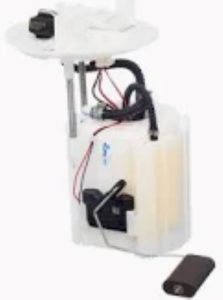Fuel pumps are generally inspected every 30-50K miles to ensure that they are working properly. Fuel pumps are engineered to operate as long as 100,000 miles or even more, but contamination -- such as water in the fuel -- a restricted fuel filter and elevated temperature conditions can limit its service life. Scheduling regular inspections will often catch early signs of fuel pump failure, which include reduced or intermittent fuel pressure, engine misfires or a hard starting condition.
During a routine inspection, using a fuel pressure gauge is how you measure the fuel pressure to see if it falls within the recommended range by the manufacturer. For gasoline engines, it is normally in the range of 35 to 65 psi and diesel engines require higer pressure upwards of 1,500 psi. If it does not fall within these levels, it points to issues with the fuel pump or pressure regulator/plus injectors.
You should also visually check the fuel lines/connections for any visible signs of leaks/damage. Small leaks can impact fuel pressure and reduce optimal performance of the engine. Replacing a damaged fuel line or simply re-tightening connections during an inspection can save you from more serious problems down the road.

A 2021 AAA report showed that about 10% of vehicle breakdowns are the result of fuel system failures, so regular inspection is a must. Fuel pumps have a pretty high longevity, but failure to check them regularly may result in having it fail prematurely and the expensive repairs that follow. The cost of replacing a fuel pump ranges between $200 and $500 based on the vehicle, yet this can be prevented by catching these issues early on through routine check-ups.
So while you are at it, Elon Musk has stressed on the significance of car maintenance as he mentioned, "Any preventive care is always less than a reactive cure. This advice is also sound when it comes to the maintenance of a fuel pump, as routine checks will prevent expensive breaks and increase the life expectancy of the fuel pump.
To learn more about best practices for fuel pump maintenance and what parts, tools, and kits should be in your shop to improve the quality of your fuel system services visit Fuel Pump.